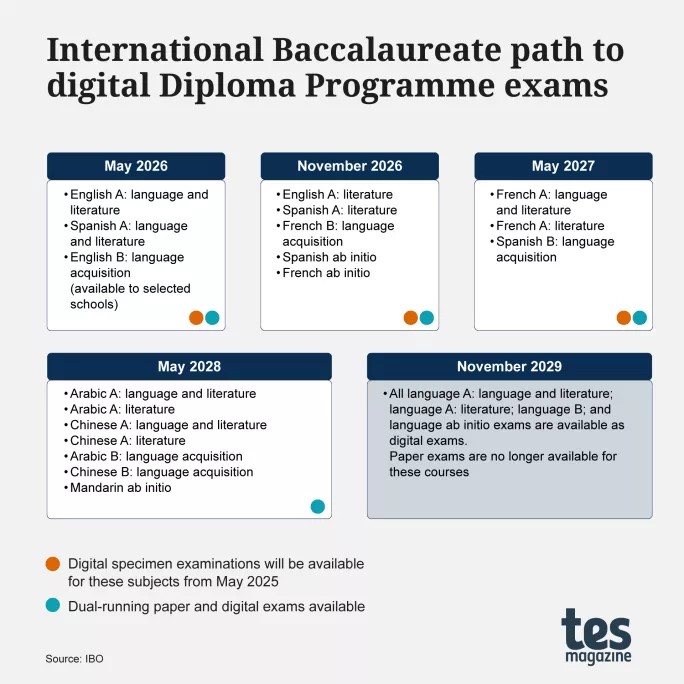- Home
- Analysis
- Specialist Sector
- IB plans digital exams for Diploma Programme from 2026
IB plans digital exams for Diploma Programme from 2026

The International Baccalaureate Organisation (IBO) has revealed details of its plans to pilot digital exams for its Diploma Programme (DP) in the summer of 2026, with the aim of all DP exams being taken using computers in the 2030s.
In total, more than 60 “pioneer schools”, teaching 3,000 pupils, are set to take part in the first pilot, with English language and literature, Spanish language and literature and English B (standard level) becoming the first subjects to be delivered digitally. More will be added in each of the following years, including French, Arabic and Chinese.
While the IB already uses digital assessments for its Middle Year Programme (MYP) exams, the move to do this for its high-profile DP exams, which determine students’ onward university or employment options, is a notable development.
The time has come
Speaking to Tes about the plans, IB director of assessment Matt Glanville said the organisation wants to “embrace digital innovation within the education system” by delivering exams in a way that is more realistically aligned to how students already learn and will work in the future.
“They’re not going to spend three hours writing down an essay. They’re going to be interacting with computers in their day-to-day life,” he said. “So why don’t we make this the way they engage [with exams].”
He said the aim is that after the first digital exams have taken place in 2026, the IB will bring “a wider range of subjects and more schools” into the fold as part of a steady shift to digital assessments: “We’re very conscious it is a big change for many schools, so we’re trying to do it in a proportionate way - not a big bang.”
This also means digital exams will match the content of paper exams for the years ahead, to ensure there is “comparability” between students, he added.

New possibilities
Mr Glanville said there is no question that moving to digital exams opens up new assessment possibilities that the IB organisation wants to explore.
“There is low-hanging fruit, like using video or audio clips, but also the potential for things like [students] being able to generate their own data in a science exam that they use to answer questions, or moving beyond two-dimensional graphics in chemistry.
“As an assessment expert, these opportunities are what makes me really excited.”
As part of preparations for this transition, the organisation surveyed its member schools to understand their readiness for digital exams and, as a result, is confident they can move forward.
“We found the vast majority of schools have the infrastructure to support this, and those that don’t are planning to have that infrastructure as part of their teaching and learning,” Mr Glanville said.
“So we are very comfortable schools will be able to get the infrastructure in place in the timelines that we are thinking of.”
He acknowledged many schools will still have questions about how it is going to work, but said the pioneer school insights should prove to teachers that it can work, while also helping to ensure that parents and pupils are on board too.
“I think there is a groundswell of strong desire from students to interact in the way that makes sense to them,” he said, adding that it should improve accessibility arrangements too.
“At the moment, access arrangements require students to tell us in advance about their need for a different colour palette or fonts, and so on. But with the digital environment, they can have control over those elements,” he said.
Read more: What is the International Baccalaureate?
Leaders reactions
The IB organisation would also give teachers and pupils the opportunity to try out its online assessments - similar to how practice papers are used - in a public-facing online portal, he said.
“It’s absolutely critical we support teachers by giving them the chance to see what it’s going to look like, [so] we will be offering practice exams for them to see how the system works, what the buttons do, how you click through, what it looks like.”
The plan comes almost three years after the organisation’s director general, OIli-Pekka Heinonen, told Tes that he wanted to start considering how to embrace digital assessments in the IB. At the time, leaders were broadly supportive of this aim.
Now, with a timeline for how it will happen, leaders have once again given a cautious welcome to the move.
Tracey Trusler, academies director (south-east London and north-west Kent) for the 33-school Leigh Academies Trust, the largest IB community of schools in Europe, said she welcomed the development and was something she felt most pupils would welcome too.
“We are a digital trust and it’s the usual way of working for all of our students, so I don’t think they would be fazed in any way,” she told Tes, adding that the trust’s investment in digital strategy means it would be confident of having the infrastructure in place already.
“We have a very strong IT team, from the networking and infrastructure to the digital curriculum and the learning platforms. All those things are in place, so our team would be well equipped to, if this becomes the norm, adapt and build on the infrastructure if necessary,” she said.
John Nicholls, director of education at the international schools group Globeducate, also welcomed the move and said that starting with a “small set of exams and slowly rolling out the programme makes sense”. He was confident its schools had the infrastructure to deliver digital exams - and that this was likely to be welcomed by its community.
“Students and teachers will appreciate this new development as so much work is already produced digitally rather than handwritten,” he said.
He added that it would likely remove logistical issues around “storing and giving out physical papers” and help to reduce the environmental impact of exam season.
Laura Hamilton, assistant head (IB diploma) at Aiglon College in Switzerland, also welcomed the staggered timeline, but said the need for clear and prompt communications to schools was vital as it progressed.
“The IB must recognise the immense workload of DP coordinators and examination teams during exam season,” she said. “It’s crucial to avoid adding unnecessary stress to both staff and students in an already demanding period.”
She also said her school was confident it had the necessary infrastructure and devices to deliver digital exams and welcomed the reduced environmental impact - noting, too, that the change could have benefits for exam markers.
“An obvious advantage is that it will help examiners assess more consistently, removing frustration from deciphering handwriting from exam scripts.”
Issues ahead
However, she noted new challenges would emerge, such as ensuring that invigilators had the technology skills to fix any issues that arise during exams.
Concerns around technology were also raised by Liz Free, CEO and director of International School Rheintal in Switzerland, and a member of the Tes Global Advisory Board, who said a fully digital IB DP system would require a substantial investment of at least £25,000 for her school.
“We would require many more exam-ready devices that are essentially then used for only one purpose,” she told Tes.
“We have found protocols for examination usage for students using digital devices already, as part of inclusive accommodations, are so specific that you can’t take the risk of having multi-use devices that are used for other purposes throughout the year.”
She said issues such as the internet going down on an exam day would also need consideration: “Protocols will be put in place but it does create an additional risk, which needs to be managed and, hopefully, mitigated.”
Nevertheless, Ms Free said she thought students would welcome the switch to digital exams and that plans to trial it over a number of years to address any issues were sensible.
Mr Glanville said that ultimately, this was the organisation’s aim, and that it was confident that the widespread use of technology across society, combined with allowing time to address any issues that may surface, made it the right time to plot its path to a fully digital exams system.
“Education is always quite risk averse to making changes, but now there is public confidence that we know technology works well in so many aspects of our lives, we can take that confidence into the education space.”
For the latest education news and analysis delivered every weekday morning, sign up for the Tes Daily newsletter
Keep reading for just £1 per month
You've reached your limit of free articles this month. Subscribe for £1 per month for three months and get:
- Unlimited access to all Tes magazine content
- Exclusive subscriber-only stories
- Award-winning email newsletters
topics in this article



